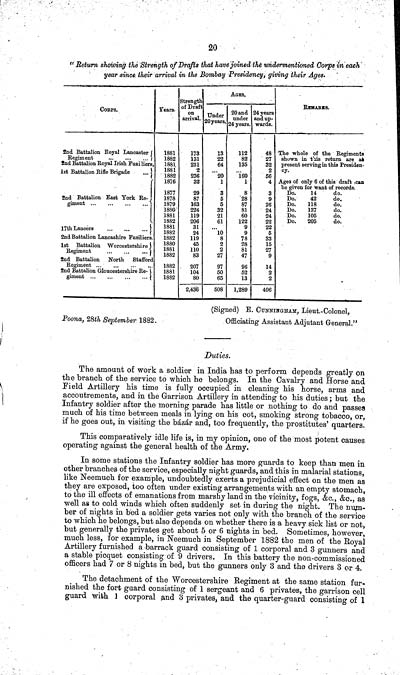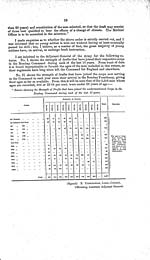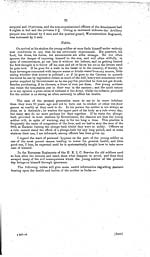Medicine - Disease > Report on enteric fever
(36) Page 20
Download files
Individual page:
Thumbnail gallery: Grid view | List view

20
"Return showing the Strength of Drafts that have joined the undermentioned Corps in each
year since their arrival in the Bombay Presidency, giving their Ages.
Corps
Years
Strength of draft on arrival
Ages
Remarks
Under 20 years
20 and under 24 years
24 years and upwards
2nd Battalion Royal Lancaster
Regiment
1881
173
13
112
48
The whole of the regiment shown in this return are as present serving in this Presidency.
Ages of only 6 of this draft can be given for want of records.
Do 14 do
Do 42 do
Do 118 do
Do 137 do
Do 105 do
Do 205 do
1882
131
22
82
27
2nd Battalion Royal Irish Fusi liers,
1881
231
64
135
32
1st Battalion Rifle Brigade
1881
2
2
1882
236
20
160
56
2nd Battalion East York Regiment
1876
32
1
1
4
1877
29
3
8
3
1878
87
5
28
9
1879
163
5
87
26
1880
224
32
81
24
1881
119
21
60
24
1882
206
61
122
22
17th Lancers
1881
31
9
22
1882
24
10
9
5
2nd Battalion Lancashire Fusiliers
1882
119
8
78
33
1st Battalion Worcestershire Regiment
1880
45
2
28
15
1881
110
2
81
27
1882
83
27
47
9
2nd Battalion North Stafford Regiment
1882
207
97
96
14
2nd Battalion Gloucestershire Regiment
1881
104
50
52
2
1882
80
65
13
2
2436
508
1289
406
(Signed) E. CUNNINGHAM, Lieut.-Colonel,
Poona, 28th September 1882. Officiating Assistant Adjutant General."
Duties.
The amount of work a soldier in India has to perform depends greatly on
the branch of the service to which he belongs. In the Cavalry and Horse and
Field Artillery his time is fully occupied in cleaning his horse, arms and
accoutrements, and in the Garrison Artillery in attending to his duties; but the
Infantry soldier after the morning parade has little or nothing to do and passes
much of his time between meals in lying on his cot, smoking strong tobacco, or,
if he goes out, in visiting the bzr and, too frequently, the prostitutes' quarters.
This comparatively idle life is, in my opinion, one of the most potent causes
operating against the general health of the Army.
In some stations the Infantry soldier has more guards to keep than men in
other branches of the service, especially night guards, and this in malarial stations,
like Neemuch for example, undoubtedly exerts a prejudicial effect on the men as
they are exposed, too often under existing arrangements with an empty stomach,
to the ill effects of emanations from marshy land in the vicinity, fogs, &c., &c., as
well as to cold winds which often suddenly set in during the night. The num-
ber of nights in bed a soldier gets varies not only with the branch of the service
to which he belongs, but also depends on whether there is a heavy sick list or not,
but generally the privates get about 5 or 6 nights in bed. Sometimes, however,
much less, for example, in Neemuch in September 1882 the men of the Royal
Artillery furnished a barrack guard consisting of 1 corporal and 3 gunners and
a stable picquet consisting of 9 drivers. In this battery the non-commissioned
officers had 7 or 8 nights in bed, but the gunners only 3 and the drivers 3 or 4.
The detachment of the Worcestershire Regiment at the same station fur-
nished the fort guard consisting of 1 sergeant and 6 privates, the garrison cell
guard with 1 corporal and 3 privates, and the quarter-guard consisting of 1
"Return showing the Strength of Drafts that have joined the undermentioned Corps in each
year since their arrival in the Bombay Presidency, giving their Ages.
Corps
Years
Strength of draft on arrival
Ages
Remarks
Under 20 years
20 and under 24 years
24 years and upwards
2nd Battalion Royal Lancaster
Regiment
1881
173
13
112
48
The whole of the regiment shown in this return are as present serving in this Presidency.
Ages of only 6 of this draft can be given for want of records.
Do 14 do
Do 42 do
Do 118 do
Do 137 do
Do 105 do
Do 205 do
1882
131
22
82
27
2nd Battalion Royal Irish Fusi liers,
1881
231
64
135
32
1st Battalion Rifle Brigade
1881
2
2
1882
236
20
160
56
2nd Battalion East York Regiment
1876
32
1
1
4
1877
29
3
8
3
1878
87
5
28
9
1879
163
5
87
26
1880
224
32
81
24
1881
119
21
60
24
1882
206
61
122
22
17th Lancers
1881
31
9
22
1882
24
10
9
5
2nd Battalion Lancashire Fusiliers
1882
119
8
78
33
1st Battalion Worcestershire Regiment
1880
45
2
28
15
1881
110
2
81
27
1882
83
27
47
9
2nd Battalion North Stafford Regiment
1882
207
97
96
14
2nd Battalion Gloucestershire Regiment
1881
104
50
52
2
1882
80
65
13
2
2436
508
1289
406
(Signed) E. CUNNINGHAM, Lieut.-Colonel,
Poona, 28th September 1882. Officiating Assistant Adjutant General."
Duties.
The amount of work a soldier in India has to perform depends greatly on
the branch of the service to which he belongs. In the Cavalry and Horse and
Field Artillery his time is fully occupied in cleaning his horse, arms and
accoutrements, and in the Garrison Artillery in attending to his duties; but the
Infantry soldier after the morning parade has little or nothing to do and passes
much of his time between meals in lying on his cot, smoking strong tobacco, or,
if he goes out, in visiting the bzr and, too frequently, the prostitutes' quarters.
This comparatively idle life is, in my opinion, one of the most potent causes
operating against the general health of the Army.
In some stations the Infantry soldier has more guards to keep than men in
other branches of the service, especially night guards, and this in malarial stations,
like Neemuch for example, undoubtedly exerts a prejudicial effect on the men as
they are exposed, too often under existing arrangements with an empty stomach,
to the ill effects of emanations from marshy land in the vicinity, fogs, &c., &c., as
well as to cold winds which often suddenly set in during the night. The num-
ber of nights in bed a soldier gets varies not only with the branch of the service
to which he belongs, but also depends on whether there is a heavy sick list or not,
but generally the privates get about 5 or 6 nights in bed. Sometimes, however,
much less, for example, in Neemuch in September 1882 the men of the Royal
Artillery furnished a barrack guard consisting of 1 corporal and 3 gunners and
a stable picquet consisting of 9 drivers. In this battery the non-commissioned
officers had 7 or 8 nights in bed, but the gunners only 3 and the drivers 3 or 4.
The detachment of the Worcestershire Regiment at the same station fur-
nished the fort guard consisting of 1 sergeant and 6 privates, the garrison cell
guard with 1 corporal and 3 privates, and the quarter-guard consisting of 1
Set display mode to: Large image | Zoom image | Transcription
Images and transcriptions on this page, including medium image downloads, may be used under the Creative Commons Attribution 4.0 International Licence unless otherwise stated. ![]()
| India Papers > Medicine - Disease > Report on enteric fever > (36) Page 20 |
|---|
| Permanent URL | https://digital.nls.uk/74577646 |
|---|
| Description | Dated 1883, report of typhoid fever at stations occupied by British troops in Bombay Presidency. |
|---|---|
| Shelfmark | IP/13/SB.6 |
| Additional NLS resources: | |




